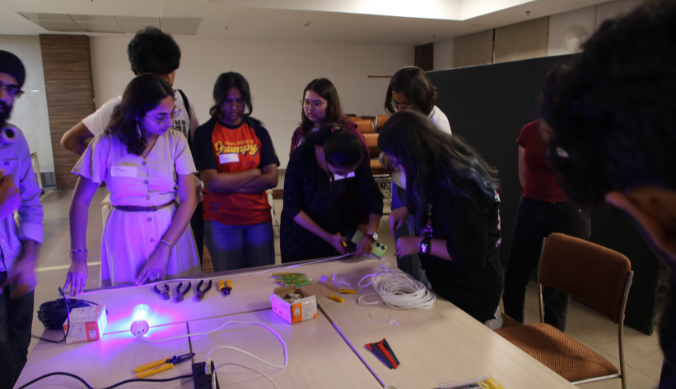Navigating Through Transition: A Guide for Parents and Students
As daunting as it may be, following are some ways that can come in handy while you are navigating through this phase of your life.
Transitions are an inevitable part of life. Right from coming out of the womb to taking our first steps, starting school, graduating, moving cities, states or even countries, we have all been through multiple transitions in our lives and will continue to do so as life progresses.
Transition to university can be an uncertain time for students as well as their parents and guardians. It can bring with it a host of different emotions such as excitement, joy, sadness, fear, anger, which can often create overwhelm. These emotions are a natural, even healthy, part of any phase of big change in our lives. Too many changes at once, can at times feel chaotic, but no matter what emotions we are experiencing, taking a few proactive steps can help us ride the wave of transition more smoothly.
Ashoka is the only University of its kind that is cognizant of the effect transitioning to a new university has on students as well as on their parents and attempts to create a space where all can manage it to the best of their capacities.
For Parents
As parents it can be confusing to know how to support your ward’s transition. Striking a balance between encouraging their autonomy and acting on your concerns is can be difficult. The following would help to address your concerns and allow you to help your ward enhance their Ashoka Experience.
Your ward might be going through an emotionally difficult time if they:
- Shows disengagement from family, friends and activities
- Has difficulty focusing in class, sleeping and/or eating
- Finds it difficult to cope with social pressures of residence life
- Appears and/or speaks about feeling agitated, anxious, lonely or depressed
If you perceive your ward displaying the above signs over a period of time, it would help you to:
- Stay calm – your anxiety could trigger further anxiety in your ward
- Listen, Listen, Listen; lend an ear without interrupting, advising or asking too many questions
- Respect your ward and their problems by validating their feelings
- Avoid telling them not to worry as that can be unhelpful
- Encourage your ward to reach out to support systems around them
- You can encourage them to reach out to Ashoka Centre for Well-Being (ACWB) for emotional support
- Reach out to us with your concerns regarding your ward’s well-being through email
If your ward is on psychiatric medication, it would help to:
- Encourage your ward to take responsibility for following medication dosages
- Help your ward scheduling regular follow-ups with the psychiatrist
- Encourage your ward to reach out to ACWB for emotional support
For Students
It can be exciting as well as scary to come to a new environment and start living your life amongst strangers. But your University experience is also the phase of your life that helps you grow into your full potential. As daunting as it may be, following are some ways that can handy while you are navigating through this phase of your life.
Consider All Possibilities
Transitions are accompanied by both positive and seemingly not positive shifts. Understanding and examining the practical realities of all these changes can make dealing with them much easier.
For example, while moving out of home to a residential campus, you could make a list of all different possible changes such as anxiety of being away from home, sharing room with a new roommate, or the excitement of being on your own, making new friends. You can then take time to process these emotions and think through what could help you be prepared to better cope with the change.
Plan Ahead
In the face of unknown, it can be helpful to have a plan to feel more in control and centred in yourself while adjusting to new situations in life. Planning ahead helps in reducing the stress and anxiety and makes you feel more confident in navigating through unfamiliar waters.
For example, if you are moving to a new city, finding out basic information such as the climate of the place can help you attain resources that will be essential for your survival there, such as warm clothes for a cold city.
Create a Social Support System
Identifying friends and family that you can reach out to can help ease the transitions as it can provide you with mental security that you are not alone and there are others who can help you manage any challenges that you might be facing.
Engage with your Immediate Environment
Change can sometimes lead us to not engage with our new reality in an attempt to protect ourselves. While this may feel safe, it is also keeping your from finding things that you may enjoy doing. Even though it may require a little extra effort in the beginning, once you find your rhythm, you may actually enjoy yourself in the newness of things.
For example, when moving to a residential campus, finding activities that you like such as sports or art societies, can help you feel more at home.
Relaxation is Key
Transitions can take up a lot of mental energy in adjusting for the new and letting go of the old. Finding time to relax and rest can help you recharge yourself to continue engaging with life in transition.
Taking Care of your Physical Health
Maintaining physical health is very closely related to your mental health. Eating nutritious food, exercising, keeping yourself hydrated and getting enough sleep can contribute greatly to your energy levels and mood states.
Journaling
Sometimes transitions might be accompanied by a mix of feelings. If not paid attention to, feelings can start to dominate our ways of functioning. Writing about your feelings can help you understand your emotions and reduce the intensity of their impact.
Practice Self-Care
While self-care is a practice one should engage in regularly, it becomes even more essential during times of transition. Self-care can look very different to different people. Identify what feels good to you and make space for that in your day. It could be reading a book, going for a walk, eating nutritious food, taking alone time or surrounding yourself with people who are kind and respectful.
Mindfulness
In times of transitions, we may often find ourselves ruminating over the past. Mindfulness and breathing practices can help us build muscle to make room for the changes that come along with transitions. Smell the flowers around you, hold an object lying next to you, go for a walk. Use your senses to become more present to where you are in the moment.
Seek Professional Help
While experiencing overwhelming emotions can be a natural part of transitions, if you find these feelings to persist for too long or become very intense, remember you are not alone. There are mental health professionals who can help you swim these waters.
(Ashoka Centre for Well-Being provides a safe and confidential space for conversations with professional counsellors.)
Study at Ashoka












